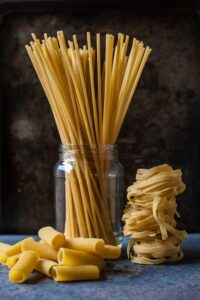I am aware that fresh pasta doesn’t require a lengthy boiling time. Just a minute or so, probably no more than two. However I have kind of a stupid question. The water in the pot stops boiling when I add my fresh pasta to it. Should I wait for another minute or two, or should I wait until it reaches a boiling point again?
What is Al Dente Pasta & How Long Do You Cook Pasta?
 The term “al dente” originates from an Italian phrase that translates to “to the tooth.” Al dente refers to the overall firmness of your cooked noodle. When your recipe calls for al dente pasta, it calls for your pasta to be tender yet still a bit firm in the center.
The term “al dente” originates from an Italian phrase that translates to “to the tooth.” Al dente refers to the overall firmness of your cooked noodle. When your recipe calls for al dente pasta, it calls for your pasta to be tender yet still a bit firm in the center.
When determining the ideal timing for al dente pasta, keep in mind that the type of pasta you use will affect this significantly. Freshly made pasta only needs to be in the water for a few minutes, but dried pasta requires a little more time. Additionally, the shape of the pasta affects how long it takes.
A favorite among families with kids who adore a good macaroni and cheese recipe is elbow macaroni. For elbow macaroni al dente, most dry pasta boxes will have precise cooking directions on the box. This specific pasta takes 7 to 15 minutes to cook through; keep in mind that some brands may be bigger than others.
The simplest method to see if you’re on the right track is to sample a single noodle. It’s probably undercooked if the middle is stiff and chalky. If it’s excessively soggy and limp instead, you’ve overcooked it.
Another challenging pasta to master when it comes to making the ideal al dente is pasta shells. And the reason for that is the range of unusual forms that these shells can have. Even though the pasta’s outermost portions seem cooked, the interior may still require some cooking time. To get the proper firmness, pasta shells should usually be cooked for 8 to 9 minutes.
Even though spaghetti and fettuccine may seem similar, there are a few important distinctions to take into account when calculating the right cooking time. Spaghetti has round, smooth noodles, whereas fettuccine has denser, thicker noodles. Additionally, the size of the spaghetti—such as thick and angel hair—affects how long it takes to cook.
After bringing the water to a boil and adding the noodles to the pot, cook for ten to fifteen minutes. However, as usual, test it out before you start saucing up.
Now, cooking fresh pasta is a lot different. The main difference between dry and fresh pasta is that the former rehydrates while cooking. It only takes a few short minutes for freshly made pasta to cook through—two to three minutes is sufficient to achieve al dente.